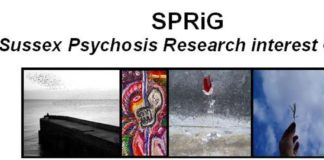Tag: first episode psychosis
Antipsychotics Lead to Worse Outcomes in First-Episode Psychosis
Those who did not get antipsychotics in the first month were almost twice as likely to be in recovery after five years.
Tanya Frank—Zig-Zag Boy: My Family’s Struggles With Broken Mental Healthcare
Author Tanya Frank discusses her book 'Zig-Zag Boy A Memoir of Madness and Motherhood', which chronicles the experiences of her son Zach who experienced psychosis as a 19-year-old.
Antipsychotics Worsen Cognitive Functioning in First-Episode Psychosis
Withholding antipsychotics may be beneficial for memory, the researchers write.
New Study: The Clinical High Risk for Psychosis (CHR-P) Model Is...
The CHR-P model focuses on “attenuated psychosis” to predict “transition” to schizophrenia and ignores other factors. But new research shows that the model is a poor predictor.
Greater Exposure to Antipsychotics Associated with Worse Long-Term Outcomes
A new study finds adverse long-term consequences associated with the increased use of antipsychotics in first-episode psychosis.
For People “At Risk for Psychosis,” Antipsychotics Associated with Worse Outcomes
Researchers studied whether antipsychotics could prevent transition to full psychosis and found that the drugs worsened outcomes.
Social Relationships Integral to Recovery in First Episode Psychosis
Research finds patients of first-episode psychosis report benefits from social relationships where their personhood is respected.
Towards Resilience and Possibilities and Away from Diseases and Symptoms
An interview with Professor Jim van Os who says that, arguably, ‘love is the most powerful evidence-based treatment in mental health’. We discuss his recent paper published in World Psychiatry which envisions a future for mental health that moves away from symptoms and diagnoses and towards peer support and lived experience.
20-year Outcomes for First-episode Psychosis: Impact of Neuroleptic Drug Discontinuation
The authors conclude that the risk of treatment failure or relapse after discontinuation of antipsychotics does not decrease during the first eight years of illness, and that long-term antipsychotic treatment is associated with increased survival. This is a sobering finding and the paper warrants careful review.
Interventions that Promote Disclosure Among Voice-Hearers
The perspectives of the voice-hearers featured in the research underscore that stigma and negative perceptions of voice hearing present significant obstacles within early intervention programs.
Social Recovery Therapy for First Episode Psychosis
Social Recovery Therapy shows promising results for individuals who experience first-episode psychosis.
New Review Suggests Higher Recovery and Remission Rates for Psychosis
Meta-analysis gives updated recovery and remission rates for persons identified as having a first-episode psychosis and those diagnosed with schizophrenia.
Dr. Joseph Firth: The Role of Exercise and Nutrition in Early...
Dr. Joseph Firth of Western Sydney University talks about his research into the role of exercise and nutrition in supporting young people in the early stages of psychotic illness.
Study Highlights Importance of Social Interactions in Psychosis Recovery
Study finds frequency of social interactions predicts long-term remission in first-episode psychosis.
Six Lessons on Open Dialogue From the Collaborative Pathway Experiment
The Collaborative Pathway is a replication and adaptation of Open Dialogue at Advocates, Inc., a human services agency in Framingham, Massachusetts where I serve as Medical Director. Last week, our team published an article in the Best Practices column of the journal Psychiatric Services, describing the program and our results from the first cohort of young people and families experiencing a psychotic crisis. This is the first published adaptation of Open Dialogue in the U.S. and represents the culmination of several years of planning, training, and direct service.
Migrants and Refugees Significantly More Likely to be Diagnosed as Psychotic
A team from Sweden's Karolinska Institute and Britain's University College of London found, in a study of 1.3 million people in Sweden's national register,...
Exercise Effective for Early Psychosis, Studies Show
A new study out of the University of Manchester found that personalized exercise programs reduced the symptoms for young people suffering from their first episode of psychosis. Researchers also conducted an accompanying qualitative analysis and found that the participants experienced improved mental health, confidence, and a sense of achievement and felt that autonomy and social support were critical to their success.
Love is Dialogical: The Open Dialogue UK International Conference and Training
In the past five years, there has been a dramatic explosion of interest in the Open Dialogue Therapy practiced in Tornio, Finland. It is a humanistic “treatment” that has produced five-year outcomes for psychotic patients that are, by far, the best in the developed world, and there are now groups in the United States, Europe and beyond that are seeking to “import” this care. However, the challenges for doing so are many and, last month, Open Dialogue UK - on the occasion of the first-ever fully recognized Open Dialogue training outside of Tornio - organized a conference in London to hold an open dialogue about Open Dialogue.
“Psychosis: With Early, Informed Intervention, There’s Hope”
Columnist Nev Jones writes about the lack of adequate care for people in the US experiencing a first-episode of psychosis. “Evidence-based (or informed) psychotherapies...
Letters to the Editor: “The Treatment of Choice”
Readers respond to the New York Times article, “The Treatment of Choice,” about innovative programs for psychosis and schizophrenia that involve patients and their families in treatment decisions. “Narratives of success counter a drumbeat of faulty links of mental illness and violence, inaccuracies which serve only to further stigmatize and isolate individuals with psychiatric illness.”
Madness and the Family, Part III: Practical Methods for Transforming Troubled...
We are profoundly social beings living not as isolated individuals but as integral members of interdependent social systems—our nuclear family system, and the broader social systems of extended family, peers, our community and the broader society. Therefore, psychosis and other forms of human distress often deemed “mental illness” are best seen not so much as something intrinsically “wrong” or “diseased” within the particular individual who is most exhibiting that distress, but rather as systemic problems that are merely being channeled through this individual.
Madness and the Family (Part Two): Towards a Unified Theory of...
In Part One of this article series, we reviewed the contemporary research into the links between psychosis, problematic family dynamics, and other forms of childhood trauma. After reviewing this research, we find that a very interesting and important question emerges: What do all of these have in common? In other words, is there some common denominator that all of these types of trauma and patterns of problematic family dynamics share, a single underlying factor that makes someone particularly vulnerable to experiencing a psychotic crisis? Indeed, I believe that there is.
Massachusetts Launches New Strengths-Based Early Psychosis Program
ServiceNet, a mental health and human service agency in western Massachusetts, received a three year, two million dollar grant to launch a program designed to support young adults who have recently experienced their first episode of psychosis. The Prevention and Recovery Early Psychosis (PREP) program is funded by the Massachusetts department of mental health and is designed to treat psychosis as a symptom, not an illness, resulting from other illnesses, substance abuse, trauma, or extreme stress.
The Recovery After an Initial Schizophrenia Episode (RAISE) Study: Notes from...
I was a psychiatrist who participated in the Recovery After an Initial Schizophrenia Episode Early Treatment Program (RAISE ETP). Although I welcomed the positive headlines that heralded the study's results, the reports left me with mixed feelings. What happened to render the notion that talking to people about their experiences and helping them find jobs or go back to school is something novel?
NIMH: RAISE Study to Have Immediate Clinical Impact
In a Science Update, the National Institute of Mental Health (NIMH) reports that Medicaid services is already taking steps to implement “coordinated specialty care” (CSC) in response to the RAISE study released last week. “The RAISE initiative has shown that coordinated specialty care for first episode psychosis is better than the standard care offered in community clinics. However, covering the cost of coordinated specialty care can be challenging. When Medicaid agrees to pay for effective treatment programs, patients in need benefit.”
























